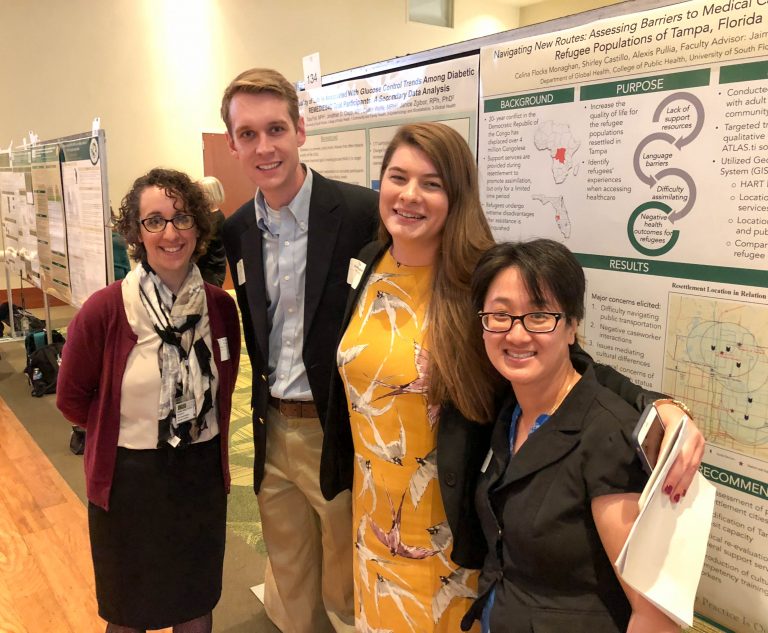Transforming the MPH core curriculum
First published on February 10, 2020 in observance of the COPH’s 35th anniversary celebration.
The USF College of Public Health become one of the first public health programs in the nation to transform the core curriculum to meet 21st century public health needs and to meet changing Council for Education in Public Health (CEPH) competency requirements in 2014.
“This curriculum was designed to reflect the true, interdisciplinary nature of public health. While, historically, schools and colleges of public health have introduced students to the core curriculum of public health in the first year of the master of public health (MPH) program from independent perspectives, this approach lacked an interdisciplinary and integrated approach required to address public health problems,” said Dr. Jaime Corvin, associate professor and director of the MPH program.

Faculty at the COPH were charged with addressing this problem, rethinking our curriculum and developing a program to prepare the next generation of public health professionals.
Today, more than 700 students have successfully completed the new core at USF and have earned the Certified in Public Health (CPH) designation, a requirement of the new program.
“People often ask, why change the core?” Corvin said. “Simply put, our MPH program was a strong program. But it was no longer addressing the realities of 21st century public health problems. We deal with complex problems, we come together as multidisciplinary teams to address these issues, and we don’t act in silos. There was a need to teach traditional content but in an integrated fashion and to ensure that our students were receiving practical, hands-on-training.”
The COPH’s MPH program now integrates rigorous public health training with broad exposure to the breadth and depth of the field, according to Corvin.
Students learn the traditional public health content but are required to apply those skills through case studies, communications assignments, and the analysis of public health data in History and Systems, Population Assessment I and Population Assessment II, as well as the development of public health promotion campaigns in Translation to Practice.
“Students work in groups, they debate, they write – a lot – and they synthesize public health problems, coming together to develop innovative strategies to address the problems poised,” Corvin said.
The MPH core courses are taught by a team of faculty and leaders within the college, including Dean Donna Petersen and Drs. Anna Armstrong, Jason Beckstead, Tom Bernard, Joe Bohn, Jaime Corvin, Rita Debate, Zac Pruitt, Troy Quast, Tom Unnasch, Kate Wolfe-Quintero, Ronee Wilson and Janice Zgibor.

In addition, each cohort is supported by a team of doctoral and masters level teaching assistants. Together, this team strives to provide the best experience for students as they learn and practice the foundational public health concepts.
Corvin also shared how, as the student body changed and as CEPH competencies were revised, revisions were required to ensure students were graduating with the tools and skills needed to be successful in the workforce.
Such revisions included a renewed focus on communication and leadership, the importance of writing and the need for enhanced professional development skills.
“In fact, Dr. Anna Armstrong, who leads the USF BullPEN initiative, recently conducted a study to assess professional development needs of our students as perceived by our students and the local workforce,” Corvin said.
Armstrong found that students felt they needed job readiness skills and employers believed students needed help with communication and professional development.
As a result, the USF BullPEN was launched and elements of professional development were incorporated in the Core curriculum.
Corvin and Armstrong believe that the focus on professional development will help our students to be better prepared as they enter the workforce. They also hope that this will instill a culture of continuing education, lifelong learning, and professional development, all important tenants of the field.
“It’s a lot of work and it takes a commitment. A commitment to your studies and to the field. But we hear back from our graduates about how prepared they feel in their new careers. To me, there is nothing more rewarding,” Corvin said when asked how students receive the program.
The faculty often receive feedback that the strength of USF’s MPH program is its focus on integration of core subject areas and real-world application.
Hari Venkatachalam, a recent graduate of the program, shared “when I joined the Department of Veterans Affairs as a Health Science Research Specialist, I found myself initially overwhelmed with the diversity among the research staff: There were nurses, anthropologists, physical therapists, and biostatisticians. They each brought such unique skills. But that’s what the USF’s MPH program prepares its students for. It prepares us for real world public health work, whether it’s by giving us the analytical skills to perform data management, honing the investigative skills to perform reviews of literature, or the fine-tuning of our writing and oratory skills to defend a program’s implementation. The program is built in a manner that when a student joins the workforce, they find themselves jumping into the position like riding a bike; The skills have become second-nature.”
Other students have gone on to continue their education, USF’s MPH serving as a strong foundation for the next step in their career path.
“I found that I entered the program vastly more prepared and comfortable than my peers, and have bragged about my integrated MPH on more than one occasion,” said Amina Zeidan who is now a doctoral student in a translational science program at the University of Texas. “These courses were more realistic and relate-able to real life work experiences.”
Corvin said the MPH committee will continue to evaluate and revise the core, striving for a more rigorous foundation for the next generation of public health professionals.
“Our graduates are the future – public health professionals poised to bring people together and to be the change!” Corvin said.
Story by USF COPH Staff Writer
